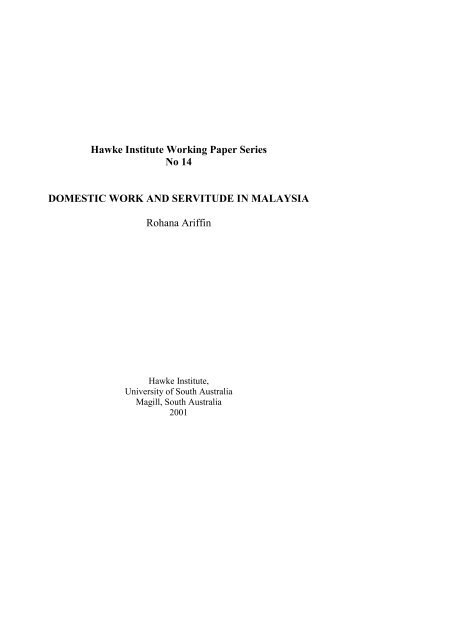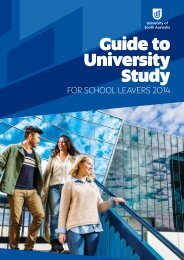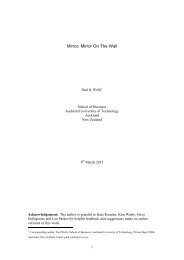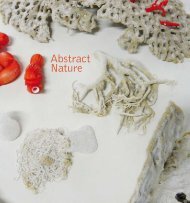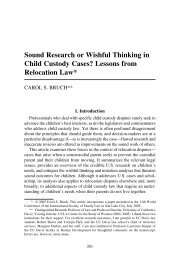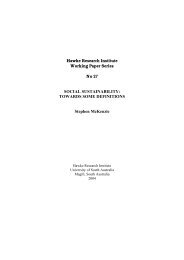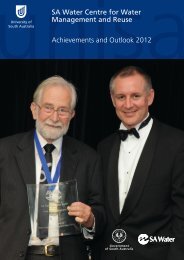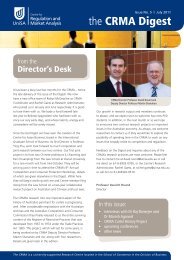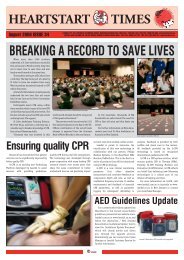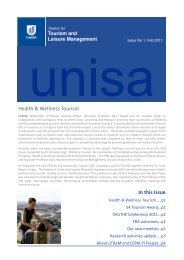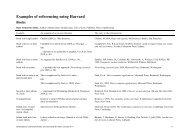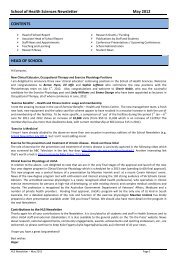Domestic Work and Servitude in Malaysia - University of South ...
Domestic Work and Servitude in Malaysia - University of South ...
Domestic Work and Servitude in Malaysia - University of South ...
You also want an ePaper? Increase the reach of your titles
YUMPU automatically turns print PDFs into web optimized ePapers that Google loves.
Hawke Institute <strong>Work</strong><strong>in</strong>g Paper Series<br />
No 14<br />
DOMESTIC WORK AND SERVITUDE IN MALAYSIA<br />
Rohana Ariff<strong>in</strong><br />
Hawke Institute,<br />
<strong>University</strong> <strong>of</strong> <strong>South</strong> Australia<br />
Magill, <strong>South</strong> Australia<br />
2001
© Rohana Ariff<strong>in</strong> <strong>and</strong> the Hawke Institute,<br />
<strong>University</strong> <strong>of</strong> <strong>South</strong> Australia 2001<br />
The Hawke Institute<br />
<strong>University</strong> <strong>of</strong> <strong>South</strong> Australia<br />
St Bernards Road<br />
Magill<br />
<strong>South</strong> Australia 5072<br />
Australia<br />
www.hawkecentre.unisa.edu.au/<strong>in</strong>stitute<br />
ISSN 1443-9298<br />
ISBN 0 86803 813 X
DOMESTIC WORK AND SERVITUDE IN MALAYSIA<br />
INTRODUCTION<br />
Rohana Ariff<strong>in</strong> *<br />
In recent decades, Asian countries have closely followed neo-liberal economic<br />
policies, <strong>in</strong>clud<strong>in</strong>g massive privatisation, liberalisation <strong>and</strong> <strong>in</strong>tegration <strong>in</strong>to the<br />
global free market economy. There was a rapid transformation <strong>in</strong> many countries <strong>in</strong><br />
the ASEAN region <strong>in</strong> the 70s when they embarked on export-oriented<br />
<strong>in</strong>dustrialisation (EOI). With<strong>in</strong> this period <strong>of</strong> globalisation, capital, technology <strong>and</strong><br />
<strong>in</strong>formation, especially from America <strong>and</strong> other western countries, rapidly crossed<br />
national boundaries. Asian countries received an onslaught not only <strong>of</strong> economic<br />
capitalism, but <strong>of</strong> technology <strong>and</strong> <strong>in</strong>formation with its cultural accompaniment as<br />
well.<br />
In the ASEAN region, S<strong>in</strong>gapore has experienced the most rapid <strong>in</strong>dustrialisation,<br />
followed closely by <strong>Malaysia</strong>. <strong>Malaysia</strong>’s growth rate over the last decade has been<br />
more than 8 per cent. Surround<strong>in</strong>g countries such as Indonesia, Thail<strong>and</strong> <strong>and</strong> the<br />
Philipp<strong>in</strong>es improved their economy too but at a slower rate than <strong>Malaysia</strong> <strong>and</strong><br />
these countries have surplus labour.<br />
The migration <strong>of</strong> labour from supply<strong>in</strong>g countries (ie Indonesia, Philipp<strong>in</strong>es, Sri<br />
Lanka, Bangladesh, Burma, Ch<strong>in</strong>a, India, Nepal <strong>and</strong> Pakistan) to recipient<br />
countries such as Brunei, Hong Kong, S<strong>in</strong>gapore <strong>and</strong> <strong>Malaysia</strong> primarily occurs for<br />
economic reasons. Firstly, migrants are will<strong>in</strong>g to take up jobs that locals refuse<br />
(due to better education etc), <strong>and</strong> secondly unregulated <strong>and</strong> marg<strong>in</strong>alised workers<br />
provide a competitive advantage to countries promot<strong>in</strong>g export growth. Thirdly,<br />
prosperity has promoted a consumerist lifestyle, creat<strong>in</strong>g employment <strong>in</strong> the<br />
domestic <strong>and</strong> enterta<strong>in</strong>ment sector (Asian Migrant Centre 1998: 30). Eighty-five<br />
per cent <strong>of</strong> migrant workers are women.<br />
AFTER 1957: POST-INDEPENDENCE PERIOD<br />
<strong>Malaysia</strong> adopted import substitution <strong>in</strong>dustrialisation <strong>in</strong> the 1960s <strong>in</strong> an attempt to<br />
create jobs for unemployed youth. S<strong>in</strong>ce the 1950s universal education had been<br />
provided for the population, result<strong>in</strong>g <strong>in</strong> many youth atta<strong>in</strong><strong>in</strong>g either a mid-<br />
* Associate Pr<strong>of</strong>essor, Department <strong>of</strong> Sociology, <strong>University</strong> Sa<strong>in</strong>s <strong>Malaysia</strong>,<br />
Penang. Dr Ariff<strong>in</strong> was a visit<strong>in</strong>g scholar at the <strong>University</strong> <strong>of</strong> <strong>South</strong> Australia <strong>in</strong><br />
March 2001, hosted by the Hawke Institute <strong>and</strong> the Centre for International <strong>and</strong><br />
Cross-Cultural Studies. This is the text <strong>of</strong> a sem<strong>in</strong>ar she presented at the Hawke<br />
Institute on 28 March 2001.
2 ROHANA ARIFFIN<br />
secondary school or secondary school qualification. With <strong>in</strong>dustrialisation, many<br />
youth migrated to town <strong>in</strong> search <strong>of</strong> jobs <strong>in</strong> the factories. At that stage, male youth<br />
exceeded female immigrants. With their departure from the rural areas, agricultural<br />
jobs were ab<strong>and</strong>oned <strong>and</strong> employers sought the service <strong>of</strong> migrant workers, ma<strong>in</strong>ly<br />
from Indonesia.<br />
From the 60s, the <strong>Malaysia</strong>n economy grew rapidly, <strong>and</strong> many jobs were created <strong>in</strong><br />
the agricultural <strong>and</strong> construction sectors. This drew foreign labour <strong>in</strong>to the country,<br />
<strong>in</strong> particular Indonesian migrant labour. The <strong>in</strong>dustrialisation process also created<br />
more opportunities for local workers to move from less skilled, lower paid jobs to<br />
better ones.<br />
FROM THE 1970s: PERIOD OF EXPORT-ORIENTED<br />
INDUSTRIALISATION<br />
In the 70s, when export-oriented <strong>in</strong>dustrialisation overtook import substitution,<br />
young women were drawn to work <strong>in</strong> export <strong>in</strong>dustries. At that time more rural<br />
women than rural youth migrated to urban areas. Rural women, who used to be a<br />
source <strong>of</strong> domestic helpers for ‘middle class’ families, become a scarcity.<br />
The transition period <strong>of</strong> rapid urbanisation began to break down the extended<br />
family system. A domestic helper therefore became a necessity for most work<strong>in</strong>g<br />
families. Although women comprised about 25–30 percent <strong>of</strong> the labour market<br />
then, then was no supportive <strong>in</strong>frastructure to help them such as organised<br />
nurseries or k<strong>in</strong>dergartens. Women were left to fend for themselves <strong>and</strong> the<br />
domestic helper was the best alternative. But the supply was fast runn<strong>in</strong>g out, as<br />
most young women were absorbed <strong>in</strong>to the factories. The solution was to f<strong>in</strong>d<br />
foreign maids, sourced <strong>in</strong>itially from Indonesia <strong>and</strong> subsequently from the<br />
Philipp<strong>in</strong>es <strong>and</strong> Sri Lanka.<br />
The state believed that a proper system <strong>of</strong> <strong>in</strong>frastructure was needed to support<br />
<strong>in</strong>creased <strong>in</strong>dustrialisation <strong>and</strong> this <strong>in</strong>cluded the build<strong>in</strong>g <strong>of</strong> roads, transportation<br />
<strong>and</strong> other telecommunications systems. The <strong>in</strong>crease <strong>in</strong> the number <strong>of</strong> workers <strong>in</strong><br />
the urban areas, <strong>and</strong> the gradual expansion <strong>of</strong> the middle class, also created a need<br />
for hous<strong>in</strong>g estates <strong>and</strong> low-cost flats. Labour was required to build these, <strong>and</strong> local<br />
labour was <strong>in</strong> dire shortage as many <strong>Malaysia</strong>ns were reluctant to take up such<br />
work or had few skills <strong>in</strong> the construction <strong>in</strong>dustry. The government had to import<br />
foreign labour for these jobs.<br />
Thus foreign male <strong>and</strong> female workers entered <strong>Malaysia</strong>: male workers <strong>in</strong> the<br />
construction <strong>in</strong>dustry, <strong>and</strong> mostly female workers <strong>in</strong> the domestic homes <strong>and</strong><br />
service sector.<br />
Towards the early 90s, <strong>Malaysia</strong> experienced a tight labour market <strong>and</strong> there was a<br />
shortage <strong>of</strong> labour both <strong>in</strong> the manufactur<strong>in</strong>g <strong>in</strong>dustries <strong>and</strong> the exp<strong>and</strong><strong>in</strong>g service
DOMESTIC WORK AND SERVITUDE IN MALAYSIA 3<br />
sector. <strong>Work</strong>ers were imported <strong>in</strong>to the country to work <strong>in</strong> these <strong>in</strong>dustries,<br />
predom<strong>in</strong>antly women from Indonesia <strong>and</strong> Bangladesh. Besides the factories,<br />
women workers could be found <strong>in</strong> retail trade, restaurants, petrol service stations,<br />
<strong>of</strong>fice/factory clean<strong>in</strong>g <strong>and</strong> so on.<br />
Accord<strong>in</strong>g to one estimate there are about 1.5 million documented migrant workers<br />
<strong>and</strong> 200 000–500 000 undocumented foreign workers (male <strong>and</strong> female) <strong>in</strong><br />
<strong>Malaysia</strong> (Asian Migrant Centre 1998). If the figures are correct then migrant<br />
workers make up over 13 per cent <strong>of</strong> the labour market <strong>in</strong> this country.<br />
Table 1: Orig<strong>in</strong> <strong>of</strong> foreign workers <strong>in</strong> Pen<strong>in</strong>sular <strong>Malaysia</strong> <strong>in</strong> November 1997<br />
Citizenship Total Percentage<br />
Indonesia 716 033 63.92%<br />
Bangladesh 307 696 27.46%<br />
Philipp<strong>in</strong>es 24 882 2.22%<br />
Thail<strong>and</strong> 21 438 1.91%<br />
Pakistan 18 052 1.62%<br />
Others 32 071 2.86%<br />
Total 1 120 172 100.00%<br />
Source: Immigration Department, <strong>Malaysia</strong>
4 ROHANA ARIFFIN<br />
Table 2: Migrant workers accord<strong>in</strong>g to country <strong>and</strong> sectors from July 1992 to<br />
January 1997<br />
<strong>Domestic</strong><br />
Plantation<br />
Construction<br />
Indonesia 79 167 108 778 94 561 3062 30 568 1347 317 483 62.7<br />
Thail<strong>and</strong> 3879 11 120 6540 1492 298 848 24 177 4.8<br />
Philipp<strong>in</strong>es 28 587 49 1160 828 1401 668 32 643 6.4<br />
Bangladesh 56 17 366 27 578 5803 72 538 416 123 757 24.4<br />
Pakistan 53 183 1356 427 1682 3 3704 0.7<br />
India 54 306 1347 444 194 27 2372 0.5<br />
Sri Lanka 5 4 43 39 28 - 119 0.0<br />
Myanmar 17 125 675 282 123 16 1238 0.2<br />
Nepal - 25 17 97 262 - 401 0.1<br />
Nigeria - - - - - 5 5 0.001<br />
Others 7 - 137 11 54 526 735 0.2<br />
Total 111 775 137 956 1 333 414 12 485 107 148 3856 506 634 100.0<br />
Services<br />
Adapted from Immigration Dept, Kuala Lumpur.<br />
INTERACTION OF CLASS, ETHNICITY, CULTURE AND GENDER<br />
RELATIONS<br />
<strong>Malaysia</strong>’s population <strong>of</strong> three major races has lived together for a long time.<br />
However, latent tension between the races <strong>and</strong> racial polarisation has grown over<br />
the years, caus<strong>in</strong>g much concern for many <strong>Malaysia</strong>ns. Factors that have<br />
contributed to this situation have been racial politics, culture <strong>and</strong> religion. Into this<br />
milieu entered the migrant workers.<br />
In the new millennium, gender relations <strong>of</strong> <strong>in</strong>equality <strong>and</strong> male bias still exist <strong>in</strong><br />
<strong>Malaysia</strong>, re<strong>in</strong>forced by many male-<strong>in</strong>terpreted laws <strong>and</strong> religions. It is a fact that<br />
work<strong>in</strong>g women (especially those who can afford it) need domestic helpers when<br />
their children are young. Mothers <strong>and</strong> wives are still expected to be the primary<br />
Manufactur<strong>in</strong>g<br />
Others<br />
Total<br />
%
DOMESTIC WORK AND SERVITUDE IN MALAYSIA 5<br />
carers <strong>of</strong> children <strong>and</strong> to be <strong>in</strong> charge <strong>of</strong> domestic responsibilities. For <strong>in</strong>stance a<br />
recent study undertaken by the National Family Plann<strong>in</strong>g Board <strong>of</strong> over 3838<br />
respondents shows that ‘Fathers … lack <strong>in</strong>teraction with their children’ (New<br />
Straits Times, 29 May 1998). When the children fell ill, it was usually the mothers<br />
(80 per cent <strong>in</strong> this study) who took leave to care for their sick children.<br />
Almost all workers <strong>in</strong> <strong>Malaysia</strong> <strong>in</strong>clud<strong>in</strong>g migrant workers are supposedly covered<br />
by the <strong>Malaysia</strong>n Employment Act 1955 which stipulates work<strong>in</strong>g hours, holidays<br />
<strong>and</strong> workers’ rights to other benefits such as medical <strong>and</strong> maternity leave <strong>and</strong><br />
social security. But this law does not cover all migrant workers, especially<br />
domestic helpers, <strong>and</strong> the terms <strong>of</strong> employment are <strong>of</strong>ten left to the good will <strong>of</strong> the<br />
employers. Migrant workers <strong>in</strong> the factories <strong>and</strong> plantations are not covered under<br />
the Social Security Scheme (SOCSO), which covers <strong>Malaysia</strong>n workers earn<strong>in</strong>g<br />
RM 2500 <strong>and</strong> below. Employers are required to buy <strong>in</strong>surance policies for their<br />
workers as stipulated under the workers compensation law so that foreign workers<br />
are protected if any mishaps occur <strong>in</strong> the workplace.<br />
From observations <strong>and</strong> op<strong>in</strong>ions <strong>of</strong> friends, relatives, the public <strong>and</strong> my personal<br />
observations, it seems that the nature <strong>of</strong> domestic work <strong>and</strong> employment terms are<br />
dictated by the employers, <strong>and</strong> migrant workers are subjected to long hours <strong>of</strong><br />
work, not given any leave <strong>and</strong> have no rights or channels through which to<br />
negotiate their terms <strong>of</strong> employment. In addition, they are not allowed to jo<strong>in</strong><br />
unions, as they are barred by the government, <strong>and</strong> they have practically no<br />
channels through which to air their grievances.<br />
The National Family Plann<strong>in</strong>g Board study also showed that, <strong>of</strong> the maids <strong>in</strong> the<br />
households studied, 67.0 per cent are Indonesians, 23.0 per cent are locals, 5.4 per<br />
cent are Filip<strong>in</strong>os, <strong>and</strong> 3.3 per cent are other nationalities. This seems<br />
representative <strong>of</strong> the actual situation <strong>in</strong> <strong>Malaysia</strong>.<br />
The question we should ask is: Are foreign workers <strong>in</strong>volved <strong>in</strong> jobs considered<br />
dirty, degrad<strong>in</strong>g <strong>and</strong> demean<strong>in</strong>g? Their stories <strong>in</strong>dicate that most <strong>of</strong> them work <strong>in</strong><br />
areas such as construction, domestic services, workers <strong>in</strong> restaurants, clean<strong>in</strong>g<br />
services <strong>and</strong> other lowly jobs.<br />
THE WORKERS’ EXPERIENCE<br />
Many legal workers are spared the agony <strong>of</strong> l<strong>and</strong><strong>in</strong>g by boats at the various costal<br />
areas <strong>of</strong> the country. For those who come by boats, they are <strong>of</strong>ten overcrowded <strong>and</strong><br />
will l<strong>and</strong> at various po<strong>in</strong>ts <strong>in</strong> Johore, Selangor, Negri Semilan <strong>and</strong> Malacca. For the<br />
illegal immigrants, many are brought <strong>in</strong> under the dark cover <strong>of</strong> night <strong>and</strong> have to<br />
jump <strong>in</strong>to the sea near the shore <strong>and</strong> make a run for the mangrove swamps. The<br />
l<strong>and</strong> Taikong then transport them by taxi or bus. If they are caught by the police<br />
they have to bribe their way through <strong>and</strong> some are asked for sexual favours by the
6 ROHANA ARIFFIN<br />
police <strong>and</strong> immigration <strong>of</strong>ficers. Those who make it through are housed <strong>in</strong> the<br />
agent’s place after which they are sent to the various places <strong>of</strong> work.<br />
L<strong>and</strong><strong>in</strong>g <strong>of</strong> illegal migrant workers <strong>in</strong> <strong>Malaysia</strong><br />
<strong>Domestic</strong> workers have a variety <strong>of</strong> experiences with their employers. Generally<br />
the pay ranges from RM 400 to RM 800, with the Filip<strong>in</strong>o maids earn<strong>in</strong>g at the<br />
higher end <strong>and</strong> the Indonesian maids at the lower end. Several factors contribute to<br />
this <strong>and</strong> one <strong>of</strong> them is that the Filip<strong>in</strong>o maids have a better support system (eg<br />
agencies, NGOs <strong>and</strong> the state) back home as well as with<strong>in</strong> the recipient country.<br />
Filip<strong>in</strong>o maids are given rest days <strong>of</strong>f, ma<strong>in</strong>ly on Sunday for religious <strong>and</strong><br />
recreational activities. Many Filip<strong>in</strong>os can be seen congregat<strong>in</strong>g at the churches or<br />
supermarkets. They have some NGOs <strong>in</strong> the recipient country to air their<br />
grievances. This is quite absent for the Indonesian maids, who are not given any<br />
days <strong>of</strong>f. They have no place to gather for any religious <strong>and</strong> social <strong>in</strong>teractions.<br />
Their embassies until lately have been lackadaisical <strong>and</strong> reluctant to help their<br />
maids <strong>in</strong> distress. There have been many cases <strong>of</strong> maid abuse <strong>in</strong> all its forms <strong>and</strong> it<br />
is only now that the embassies are tak<strong>in</strong>g some <strong>in</strong>terest. This was preceded by local<br />
women’s NGOs clamour<strong>in</strong>g <strong>and</strong> dem<strong>and</strong><strong>in</strong>g them to take some action such as the<br />
provision <strong>of</strong> shelter <strong>and</strong> counsell<strong>in</strong>g.<br />
Many Indonesian migrant workers come to <strong>Malaysia</strong> with the impression that<br />
<strong>Malaysia</strong>ns, especially the Malays, are similar to them <strong>in</strong> terms <strong>of</strong> culture <strong>and</strong><br />
religion. For example, a maid named One said: ‘My sister says that <strong>Malaysia</strong> is like
DOMESTIC WORK AND SERVITUDE IN MALAYSIA 7<br />
Jakarta, so it will be okay’ (New Straits Times, 14 May 2000). They feel that it<br />
would not be such a big shock to work with families or factories here, as<br />
Indonesians <strong>and</strong> <strong>Malaysia</strong>ns share many cultural traits <strong>and</strong> stages <strong>of</strong> development.<br />
But when they reach <strong>Malaysia</strong> they are distributed by the recruit<strong>in</strong>g agents to<br />
various homes, rang<strong>in</strong>g from Malay to Ch<strong>in</strong>ese <strong>and</strong> Indian homes.<br />
Many <strong>of</strong> the foreign workers come from rural areas <strong>of</strong> their home countries <strong>and</strong> are<br />
ill-equipped to h<strong>and</strong>le electrical equipment or even ovens. Urban <strong>Malaysia</strong>n homes<br />
are well equipped with the latest gadgets from wash<strong>in</strong>g mach<strong>in</strong>es, vacuum cleaners<br />
<strong>and</strong> microwave ovens to computers. The maids are <strong>of</strong>ten overwhelmed by this<br />
modern equipment (New Straits Times, 14 May 2000). There are some tra<strong>in</strong><strong>in</strong>g<br />
centres <strong>in</strong> Indonesia that provide basic skills for the maids but overall most maids<br />
are ill-equipped to h<strong>and</strong>le the modern appliances.<br />
S<strong>in</strong>ce many <strong>Malaysia</strong>ns live <strong>in</strong> flats or apartments, where there are no spare rooms,<br />
the domestic maids usually have to share with the children. They are isolated from<br />
other servants <strong>and</strong> their hours <strong>of</strong> work are determ<strong>in</strong>ed by the employers. In many<br />
<strong>in</strong>stances, employers work them all the time, from clean<strong>in</strong>g the house, cook<strong>in</strong>g,<br />
wash<strong>in</strong>g <strong>and</strong> iron<strong>in</strong>g the clothes, tak<strong>in</strong>g care <strong>of</strong> the children <strong>and</strong> even wash<strong>in</strong>g the<br />
employer’s car. It is a common sight to see maids clean<strong>in</strong>g their employers’ cars<br />
either <strong>in</strong> the early morn<strong>in</strong>g or very late at night.<br />
Where there are elderly parents or relatives, the maids become their primary<br />
caretakers. So the domestic maids’ skills have to range from car<strong>in</strong>g for the very<br />
young to the elderly. Besides that, on weekends some <strong>of</strong> the maids are taken to<br />
another relative’s house to do house clean<strong>in</strong>g <strong>and</strong> other duties. There has been very<br />
little <strong>in</strong>terference from the government to ensure that employers follow the<br />
Employment Act 1955, which determ<strong>in</strong>es rest <strong>and</strong> work hours <strong>and</strong> holidays. The<br />
total power given to employers is <strong>of</strong>ten abused. The extreme cases <strong>in</strong> which maids<br />
are badly bruised or murdered attract publicity. There are thous<strong>and</strong>s more that<br />
suffer other forms <strong>of</strong> humiliation such as verbal abuse <strong>and</strong> other degrad<strong>in</strong>g<br />
treatment. Badly abused maids have made police reports <strong>and</strong> their employers have<br />
been charged with crim<strong>in</strong>al <strong>of</strong>fences. Most cases that have come to light <strong>in</strong>volved<br />
Ch<strong>in</strong>ese employers <strong>and</strong> Indonesian maids. As <strong>Malaysia</strong> has its fair share <strong>of</strong> racism,<br />
this factor <strong>and</strong> cultural differences accentuated this conflict. These words <strong>of</strong> a maid<br />
<strong>in</strong> Hong Kong describe a similar situation: ‘the government has to do some human<br />
rights education for employers, send<strong>in</strong>g out messages that racism <strong>and</strong> physical<br />
abuse are not tolerated’ (New Straits Times, 14 May 2000).<br />
Three cases are set out below as elaboration:<br />
1. Nurjanah Matyak, 40 years <strong>of</strong> age, has been regularly abused by her<br />
employer, bus<strong>in</strong>esswoman Yap Sow Li (50 years old). She has been beaten<br />
viciously many times <strong>and</strong> on one occasion beaten with a cane many times
8 ROHANA ARIFFIN<br />
on her head. She also has been forced to lick ur<strong>in</strong>e <strong>and</strong> eat hair. She had<br />
bruised <strong>and</strong> cut eyes, which could hardly open (The Sun, 1 February 2000).<br />
2. Another case <strong>in</strong>volved an Indonesian maid called Rum<strong>in</strong>ah Atem (57 years old),<br />
who was forced to live <strong>in</strong> a cage <strong>in</strong> the backyard <strong>of</strong> her employers’ (Yew Yoke<br />
Choo, 54 years old) home for 30 months. She was given only one meal a day, <strong>and</strong><br />
let out only for an hour daily to mop the floor <strong>of</strong> the house. She was not paid for<br />
seven years <strong>and</strong> never had a holiday (Asia Week, 16 June 2000).<br />
3. In the worst scenario the beat<strong>in</strong>g can lead to death. A Ch<strong>in</strong>ese employer, Cheah<br />
Lai Mooi, was charged with hitt<strong>in</strong>g her maid Kursiah Manijan (32 years <strong>of</strong> age<br />
from West Jakarta) with a stone which led to her death (New Straits Times, 22<br />
February 2000).
DOMESTIC WORK AND SERVITUDE IN MALAYSIA 9<br />
Fortunately for these women some car<strong>in</strong>g neighbours reported them to the police<br />
<strong>and</strong> they were then removed from the employer’s home to a women’s organisation.<br />
In some <strong>of</strong> the cases that were brought to the courts, employers agreed to pay<br />
monetary compensation for the wicked deeds committed on the maids (The Sun, 3<br />
October 2000). In many cases the maids are poorly represented by the overworked<br />
Deputy Public Prosecutors, who are <strong>in</strong>terested <strong>in</strong> settl<strong>in</strong>g the case as soon as<br />
possible <strong>and</strong> <strong>in</strong> the most convenient way, which is the payment <strong>of</strong> compensation.<br />
One common form <strong>of</strong> abuse is sexual abuse <strong>of</strong> maids. Many cases <strong>of</strong> this nature do<br />
not reach satisfactory settlement. Some <strong>of</strong> those responsible try to cover it up by<br />
<strong>of</strong>fer<strong>in</strong>g compensation to the maids. In other cases the case has reached court but<br />
then the maid’s visa has expired <strong>and</strong> she has been forced to return to her country.<br />
Other cases are fraught with other difficulties. Below are two cases <strong>of</strong> sexual<br />
abuse:<br />
1. A 27-year-old Filip<strong>in</strong>o maid alleged that her Croatian boss raped her four times<br />
s<strong>in</strong>ce April 1996. The Croatian boss was suddenly recalled back to his country.<br />
It seemed that he was expelled from his job as an envoy to <strong>Malaysia</strong> by his<br />
government. He has immunity <strong>in</strong> <strong>Malaysia</strong> because he was a diplomat (Star, 19<br />
October 1996).<br />
2. A 67-year-old man named Ng Chwee Chew was sentenced to 2 n<strong>in</strong>e-month<br />
sentences (concurrent) for us<strong>in</strong>g crim<strong>in</strong>al force to outrage the modesty <strong>of</strong> his<br />
25-year-old Indonesian maid. He tried <strong>and</strong> succeeded several times <strong>in</strong> touch<strong>in</strong>g<br />
<strong>and</strong> fondl<strong>in</strong>g her breasts, buttocks <strong>and</strong> thighs. Altogether, he molested her<br />
seven times (New Striats Times, 31 October 1999).<br />
Some maids run away <strong>and</strong> are recruited by pimps as they jo<strong>in</strong> their sister<br />
prostitutes. The other prostitutes came sometime earlier <strong>in</strong>to the country for the<br />
purpose <strong>of</strong> prostitution. They come on tourist visas <strong>and</strong> stay on to ply their trade.<br />
Thous<strong>and</strong>s <strong>of</strong> foreign women are <strong>in</strong>volved <strong>in</strong> such trade, some from neighbour<strong>in</strong>g
10 ROHANA ARIFFIN<br />
countries such as Thail<strong>and</strong>, <strong>and</strong> some from as far as Russia <strong>and</strong> other European<br />
countries.<br />
THE EMPLOYERS’ EXPERIENCE<br />
Only married couples with a certa<strong>in</strong> level <strong>of</strong> <strong>in</strong>come are eligible to apply for<br />
foreign maids. Recently, because <strong>of</strong> many compla<strong>in</strong>ts from the public, the<br />
Immigration Department has relaxed its rule to allow some applications from<br />
s<strong>in</strong>gle parents with ail<strong>in</strong>g parents or sick children.<br />
Although all foreign workers have to pass the medical test before be<strong>in</strong>g allowed<br />
entry <strong>in</strong>to the country, there have been many <strong>in</strong>stances where sickly maids are<br />
brought <strong>in</strong>. Employers have lamented that they had to send back their maids after a<br />
short stay (New Straits Times, 26 September 2000). This has caused a lot <strong>of</strong><br />
<strong>in</strong>convenience for employers as they have to send them back to the agency or even<br />
home, <strong>and</strong> to wait for a period without any house help. Sometimes it happens <strong>of</strong>ten<br />
<strong>and</strong> this affects the well-be<strong>in</strong>g <strong>of</strong> the family. In many cases, too, maids suddenly<br />
disappear by runn<strong>in</strong>g away, leav<strong>in</strong>g small children <strong>and</strong> the home unattended. There<br />
are now many squatter settlements where they can hide <strong>and</strong> then be re-hired by<br />
other employers. Some <strong>of</strong> the maids are married <strong>in</strong> their home countries <strong>and</strong> take<br />
the opportunity to jo<strong>in</strong> their husb<strong>and</strong>s who are work<strong>in</strong>g <strong>in</strong> construction or<br />
plantations. Some develop relationships with male migrant workers (or crim<strong>in</strong>als)<br />
<strong>and</strong> plan their escape. In many cases, too, they become accomplices (know<strong>in</strong>gly or<br />
unknow<strong>in</strong>gly) <strong>in</strong> robb<strong>in</strong>g their employers or former employers. There have also<br />
been cases <strong>of</strong> maids becom<strong>in</strong>g <strong>in</strong>volved <strong>in</strong> kidnapp<strong>in</strong>g the employers’ children<br />
(New Straits Times, 23 October 2000). Out <strong>of</strong> the 175 187 foreign maids brought <strong>in</strong><br />
legally, 30 180 maids ran away after complet<strong>in</strong>g only three months <strong>of</strong> their twoyear<br />
contract (New Straits Times, 21 October 20).<br />
Therefore, the dynamics <strong>of</strong> the relationship between domestic maids <strong>and</strong> their<br />
employers are very complex <strong>and</strong> varied, <strong>and</strong> fraught with difficulties <strong>and</strong><br />
misconceptions on both sides.<br />
Recently, the government tried to impose some form <strong>of</strong> control by mak<strong>in</strong>g maids<br />
sign an agreement with their employers, through which they are obliged to perform<br />
their work properly. On the other h<strong>and</strong>, there is no similar ‘moral obligation’<br />
agreement imposed on employers for their maids <strong>in</strong> which they have to give rights<br />
to rest <strong>and</strong> personal leave.
DOMESTIC WORK AND SERVITUDE IN MALAYSIA 11<br />
Cases <strong>of</strong> Foreign <strong>Work</strong>ers Runn<strong>in</strong>g Away from Employers<br />
States<br />
Cases<br />
As <strong>of</strong> 1999 As <strong>of</strong> 2000<br />
Maids Others Maids Others<br />
Johor 1868 3341 551 580<br />
Malacca 303 291 88 52<br />
Negeri Sembilan 171 657 63 129<br />
Selangor 2235 418 38 284 26 346<br />
Federal Territory 5519 8706 2138 2229<br />
Perak 352 1842 141 338<br />
Kedah 227 181 92 72<br />
Penang 997 1796 427 269<br />
Perlis 5 5 8 -<br />
Pahang 99 478 42 143<br />
Terengganu 32 47 11 5<br />
Kelantan 58 7 13 13<br />
Sabah 19 1 47 2<br />
Sarawak 335 419 129 116<br />
TOTAL 12 240 18 189 42 034 30 294<br />
Source: Immigration Department<br />
CONCLUSION<br />
While, on the one h<strong>and</strong>, migrant workers are welcomed as they develop the<br />
economy <strong>and</strong> help out <strong>in</strong> the service sector, on the other h<strong>and</strong>, they face negative<br />
attitudes <strong>and</strong> few support services. The government is not prepared to <strong>in</strong>clude<br />
migrant workers <strong>in</strong> its exist<strong>in</strong>g law nor enact a new one to provide better work<strong>in</strong>g<br />
conditions. It is imperative that ‘proper’ <strong>and</strong> ‘decent’ conditions <strong>of</strong> work be drawn<br />
up. Local NGOs should work with foreign NGOs with<strong>in</strong> <strong>and</strong> outside the country to<br />
help migrant workers <strong>in</strong> terms <strong>of</strong> service, counsell<strong>in</strong>g <strong>and</strong> representation. This<br />
could be done with the cooperation <strong>of</strong> <strong>Malaysia</strong>n unions. The media has been urged
12 ROHANA ARIFFIN<br />
to take a more active role <strong>in</strong> dispell<strong>in</strong>g myths <strong>and</strong> unfounded anxieties about<br />
migrant workers (Tenaganita 1998: 36). <strong>Malaysia</strong>ns should be made more aware <strong>of</strong><br />
basic human rights <strong>and</strong> decent work conditions for everyone, locals <strong>and</strong> migrant<br />
workers alike.
REFERENCES<br />
DOMESTIC WORK AND SERVITUDE IN MALAYSIA 13<br />
Asia Week, 16 June 2000.<br />
Asian Migrant Centre 1998, Asian Migrant Yearbook, AMC <strong>and</strong> APEC, Hong<br />
Kong.<br />
New Straits Times, 29 May 1999, 31 October 1999, 22 February 2000, 14 May<br />
2000, 26 September 2000, 21 October 2000, 23 October 2000.<br />
Star, 19 October 1996.<br />
The Sun, 1 February 2000, 3 October 2000<br />
Tenaganita 1998, Implications <strong>of</strong> the economic crisis on migrant workers,<br />
Tenaganita, Kuala Lumpur.
14 ROHANA ARIFFIN<br />
HAWKE INSTITUTE WORKING PAPER SERIES<br />
No 1 Marjorie Griff<strong>in</strong> Cohen, The World Trade Organisation <strong>and</strong> postsecondary<br />
education: implications for the public system <strong>in</strong> Australia,<br />
2000.<br />
ISBN 0 86803 800 8<br />
No 2 Claire Woods, Communication <strong>and</strong> writ<strong>in</strong>g: footpr<strong>in</strong>ts on a territory,<br />
2000.<br />
ISBN 0 86803 801 6<br />
No 3 Rhonda Sharp, The economics <strong>and</strong> politics <strong>of</strong> audit<strong>in</strong>g government<br />
budgets for their gender impacts, 2000.<br />
ISBN 0 86803 802 4<br />
No 4 Anne Hawke, Measur<strong>in</strong>g the impact <strong>of</strong> gambl<strong>in</strong>g: an economist’s view,<br />
2000.<br />
ISBN 0 86803 803 2<br />
No 5 Debra K<strong>in</strong>g, Stakeholders <strong>and</strong> sp<strong>in</strong> doctors: the politicisation <strong>of</strong><br />
corporate reputations, 2000.<br />
ISBN 0 86803 804 0<br />
No 6 Lois Bryson <strong>and</strong> Alison Mack<strong>in</strong>non, Population, gender <strong>and</strong><br />
reproductive choice: the motherhood questions: directions for policy,<br />
2000.<br />
ISBN 0 86803 805 9<br />
No 7 Margaret Brown, Just<strong>in</strong> Beilby <strong>and</strong> Eric Gargett, Participat<strong>in</strong>g <strong>in</strong> end<strong>of</strong>-life<br />
decisions: the role <strong>of</strong> general practitioners, 2000.<br />
ISBN 0 86803 806 7<br />
No 8 Nicholas Procter, The local-global nexus <strong>and</strong> mental health <strong>of</strong><br />
transnational communities, 2000.<br />
ISBN 0 86803 807 5<br />
No 9 Rick Sarre, Meredith Doig <strong>and</strong> Brenton Fiedler, Us<strong>in</strong>g the pr<strong>in</strong>ciples <strong>of</strong><br />
corporate social responsibility <strong>in</strong> the process <strong>of</strong> risk management <strong>and</strong><br />
accountability, 2000.<br />
ISBN 0 86803 808 3
DOMESTIC WORK AND SERVITUDE IN MALAYSIA 15<br />
No 10 Wendy Seymour, The technological promise: enhanc<strong>in</strong>g social<br />
participation <strong>and</strong> citizenship for people with disabilities, 2000.<br />
ISBN 0 86803 809 1<br />
No 11 Gerald McBride, Adelaide’s recipe for life: wisdom <strong>of</strong> the Kaurna,<br />
2000.<br />
ISBN 0 86803 810 5<br />
No 12 Ed Carson <strong>and</strong> Ben Wadham, Regional devolution,<br />
contractualism <strong>and</strong> the corporate citizen, 2001.<br />
ISBN 0 86803 811 3<br />
No 13 Howard Harris, Mak<strong>in</strong>g bus<strong>in</strong>ess ethics a competitive advantage,<br />
2001.<br />
ISBN 0 86803 812 1<br />
No 14 Rohana Ariff<strong>in</strong>, <strong>Domestic</strong> work <strong>and</strong> servitude <strong>in</strong> <strong>Malaysia</strong>, 2001.<br />
ISBN 0 86803 813 X<br />
No 15 Glen Lehman, Interpret<strong>in</strong>g globalisation us<strong>in</strong>g Taylor’s<br />
communitarian-republican model, 2001.<br />
ISBN 0 86803 814 8<br />
No 16 Mbulelo Vizikhungo Mzamane, Where there is no vision the people<br />
perish: reflections on the African renaissance, 2001.<br />
ISBN 0 86803 815 6<br />
Available from: Kate Leeson, Editor,<br />
The Hawke Institute<br />
<strong>University</strong> <strong>of</strong> <strong>South</strong> Australia<br />
St Bernards Road<br />
Magill<br />
<strong>South</strong> Australia 5072<br />
Australia<br />
Telephone +61 8 8302 4371<br />
Facsimile +61 8 8302 4776<br />
Email: kather<strong>in</strong>e.leeson@unisa.edu.au<br />
www.hawkecentre.unisa.edu.au/<strong>in</strong>stitute
16 ROHANA ARIFFIN<br />
THE HAWKE INSTITUTE<br />
The Hawke Institute undertakes research <strong>and</strong> fosters debate on democratic<br />
participation <strong>in</strong> political, economic <strong>and</strong> social life.<br />
The central themes <strong>of</strong> the Hawke Institute’s work are<br />
�� the social, cultural <strong>and</strong> economic aspects <strong>of</strong> globalisation <strong>and</strong> its susta<strong>in</strong>ability;<br />
�� issues <strong>of</strong> participation, equity <strong>and</strong> citizenship <strong>in</strong> work<strong>in</strong>g life, <strong>in</strong> education <strong>and</strong><br />
<strong>in</strong> society; <strong>and</strong><br />
�� questions <strong>of</strong> identity, <strong>of</strong> cultural production <strong>and</strong> representation, <strong>and</strong> <strong>of</strong> our<br />
place <strong>in</strong> the <strong>in</strong>ternational community <strong>and</strong> specifically <strong>in</strong> Asia.<br />
The Hawke Institute hosts sem<strong>in</strong>ar series, conferences <strong>and</strong> public lectures. It <strong>of</strong>fers<br />
Hawke Research Fellowships, visit<strong>in</strong>g fellowships <strong>and</strong> scholarships, <strong>and</strong> supports<br />
the work <strong>of</strong> sixteen affiliated research centres <strong>and</strong> groups. For details <strong>of</strong> the<br />
affiliated research centres <strong>and</strong> groups see the Hawke Institute website:<br />
www.hawkecentre.unisa.edu.au/<strong>in</strong>stitute. As well as promot<strong>in</strong>g research on a local<br />
<strong>and</strong> national level, the <strong>in</strong>stitute has strong <strong>in</strong>ternational l<strong>in</strong>ks. It is the research arm<br />
<strong>of</strong> the Bob Hawke Prime M<strong>in</strong>isterial Centre.<br />
Hawke Institute Director: Pr<strong>of</strong>essor Alison Mack<strong>in</strong>non<br />
Telephone +61 8 8302 4370<br />
Facsimile +61 8 8302 4776<br />
Email alison.mack<strong>in</strong>non@unisa.edu.au<br />
Hawke Centre Director: Ms Elizabeth Ho<br />
Telephone +61 8 8302 0371<br />
Facsimile +61 8 8302 0420<br />
Email hawke.centre@unisa.edu.au


